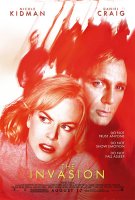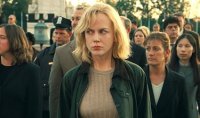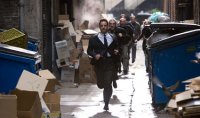DotTheEyes
Movie Fan
View the trailer...http://www.youtube.com/watch?v=yrs4YrvwPvw
The Invasion is an unfortunate casualty of studio tampering, or when suits in a boardroom decide they (not the artists) know best.
When Warner Bros. Pictures first greenlit this film, Oliver Hirschbiegel, director of the compelling, Academy Award-nominated Downfall, was at the helm. But his cut, a subtle, slow-paced update of Invasion of the Body Snatchers, was deemed too cerebral and mainstream-unfriendly to achieve significant box office success.
So WB and Joel Silver hired the Wachowski Brothers and James McTeigue, collaborators on The Matrix trilogy and V for Vendetta, to revise the film, with an emphasis on intensfiying the action and visual effects.
The dual versions were then edited together (after a long series of screenings for test audiences) and this is the version of The Invasion which has been released to theatres nationwide and around the globe.
The result is a film at war with itself. Oliver Hirschbiegel's aim was to scare the audience by subverting conventional images of family (a father embracing his son becomes an omen of doom because the audience knows the father has been infected by an extraterrestrial disease) and exploring 21st century paranoia over war and disease. The Wachowski Brothers and James McTeigue, however, seem interested only in stunt and pyrotechnic-filled action (for example, a burning car is guided through a city overrun with infected humans by a helicopter above) and stomach-turning alien gore.
Neither approach is wrong. The former slowly-but-surely unnerves with atmosphere and suggestion, not dissimilar to The Shining. The latter, with its taut editing and in-your-face shooting style, provides a potent adrenaline rush. But they don't compliment each other when placed inside a single hour-and-a-half experience. People waiting for a creepy payoff will be disappointed by the metal-crunching and explosion-heavy finale, and those who love the metal-crunching and explosion-heavy finale may be bored by the rather mild-mannered build-up. In their attempt to please everyone, has the studio instead alienated them? I fear so.
And I'm not sure which director to blame for the very ending, which defies belief in its joyful tidiness and abruptness. No lingering unease here, this ending is meant to have you smiling and bouncing out of the theatre.
The cast do their best, but at times seem obviously defeated by the troubled film's production. In the lead role of a Washington, D.C. psychiatrist who senses the menace before the invasion begins in full, Nicole Kidman conveys fear perfectly, but fails to sustain a consistent accent. I wonder, what was the point of giving a D.C. professional a Southern twang? A challenge to the actress, to see if she can hold it from scene-to-scene? If so, she failed.
Daniel Craig fares better. He gives a playful edge and unruly charisma to a rather thin love interest role. I was disappointed to see him disappear for long stretches of time in the film. And to illustrate how long this film's been gestating, he was shooting this when he learned he was cast as James Bond in Casino Royale.
Worst off is Jeffrey Wright, an underrated character actor who deserve more praise for his brilliant performance in Syriana. He tries his very, very best to lend credibility to his dialogue, most of which is fast-paced barrages of faulty science to explain how the alien infection operates (for example, it is triggered by REM sleep), but at times simply can't.
All in all, this isn't a terrible film. From a technical standpoint, it's extremely well-made (the on-location shooting in D.C. and Balitmore is invaluable) and there are fascinating and tense scenes scattered throughout. No, not a terrible film. Rather, a pair of good films crudely cut together (and saddled with an ending so ridiculous and forced it's offensive) in a misguided and desperate attempt to sate the appetites of each and every moviegoer.
This could have turned out well had the studio trusted the artistic vision and respected the audience's intelligence (not everyone needs constant action to remain interested, do they?). As it is... a curious failure I can't recommend, at least not until DVD.
The Invasion is an unfortunate casualty of studio tampering, or when suits in a boardroom decide they (not the artists) know best.
When Warner Bros. Pictures first greenlit this film, Oliver Hirschbiegel, director of the compelling, Academy Award-nominated Downfall, was at the helm. But his cut, a subtle, slow-paced update of Invasion of the Body Snatchers, was deemed too cerebral and mainstream-unfriendly to achieve significant box office success.
So WB and Joel Silver hired the Wachowski Brothers and James McTeigue, collaborators on The Matrix trilogy and V for Vendetta, to revise the film, with an emphasis on intensfiying the action and visual effects.
The dual versions were then edited together (after a long series of screenings for test audiences) and this is the version of The Invasion which has been released to theatres nationwide and around the globe.
The result is a film at war with itself. Oliver Hirschbiegel's aim was to scare the audience by subverting conventional images of family (a father embracing his son becomes an omen of doom because the audience knows the father has been infected by an extraterrestrial disease) and exploring 21st century paranoia over war and disease. The Wachowski Brothers and James McTeigue, however, seem interested only in stunt and pyrotechnic-filled action (for example, a burning car is guided through a city overrun with infected humans by a helicopter above) and stomach-turning alien gore.
Neither approach is wrong. The former slowly-but-surely unnerves with atmosphere and suggestion, not dissimilar to The Shining. The latter, with its taut editing and in-your-face shooting style, provides a potent adrenaline rush. But they don't compliment each other when placed inside a single hour-and-a-half experience. People waiting for a creepy payoff will be disappointed by the metal-crunching and explosion-heavy finale, and those who love the metal-crunching and explosion-heavy finale may be bored by the rather mild-mannered build-up. In their attempt to please everyone, has the studio instead alienated them? I fear so.
And I'm not sure which director to blame for the very ending, which defies belief in its joyful tidiness and abruptness. No lingering unease here, this ending is meant to have you smiling and bouncing out of the theatre.
The cast do their best, but at times seem obviously defeated by the troubled film's production. In the lead role of a Washington, D.C. psychiatrist who senses the menace before the invasion begins in full, Nicole Kidman conveys fear perfectly, but fails to sustain a consistent accent. I wonder, what was the point of giving a D.C. professional a Southern twang? A challenge to the actress, to see if she can hold it from scene-to-scene? If so, she failed.
Daniel Craig fares better. He gives a playful edge and unruly charisma to a rather thin love interest role. I was disappointed to see him disappear for long stretches of time in the film. And to illustrate how long this film's been gestating, he was shooting this when he learned he was cast as James Bond in Casino Royale.
Worst off is Jeffrey Wright, an underrated character actor who deserve more praise for his brilliant performance in Syriana. He tries his very, very best to lend credibility to his dialogue, most of which is fast-paced barrages of faulty science to explain how the alien infection operates (for example, it is triggered by REM sleep), but at times simply can't.
All in all, this isn't a terrible film. From a technical standpoint, it's extremely well-made (the on-location shooting in D.C. and Balitmore is invaluable) and there are fascinating and tense scenes scattered throughout. No, not a terrible film. Rather, a pair of good films crudely cut together (and saddled with an ending so ridiculous and forced it's offensive) in a misguided and desperate attempt to sate the appetites of each and every moviegoer.
This could have turned out well had the studio trusted the artistic vision and respected the audience's intelligence (not everyone needs constant action to remain interested, do they?). As it is... a curious failure I can't recommend, at least not until DVD.
Attachments
Last edited:





